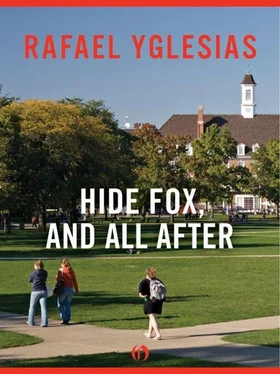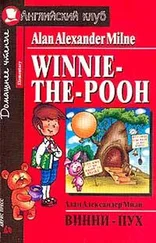Raul’s voice squirmed, each submissive note winning the night at Jeff’s. Divided against himself, he couldn’t stop the flow of fear that vomited out of him. To meet his father’s contempt and arrogance with equanimity had, long ago, been an ambition that surpassed all others. Yet nothing, as his mind viewed it with horror and hate, could stop the constant submission to him. And when he was nothing more than palpable dust, he was allowed the night at Jeff’s.
Jeff, who had watched with sympathetic, fearful eyes, asked, when he was off the phone, “You can stay?”
“Like my brother,” Raul said, making no sense. “His whole life, like that. Lie, play the role, squirm — anything to win his approval, his good graces. To face him like a man, I’d give anything for it!”
Raul, for a few days, experienced great relief, but it was mixed with apprehension. Cabot — the top school on the East Coast, Raul used to say — had bred an insecure egotism in all its students. In one assembly after another they had been told that they were the leaders of tomorrow; they had been selected, by tests, from the crème de la crème. Yet in the same breath they were informed, with horrible calm, that thousands of eager students waited for their places: Cabot didn’t need them. Whether the administrators knew it or not, this was brilliant psychology. Students who had been weeded out, usually for poor grades, felt, acutely, that any possibility of success was gone — they had failed in the most awful way. Those who graduated spent the rest of their lives getting the best: they went to the best colleges in their fields; got the best jobs; and made damn sure that this best of all possible countries stayed that way.
Raul’s ego was not quite so invulnerable as to remain unscathed. Pragmatically, it made no sense to him. He was an actor and a writer. Two professions, if you will, that Cabot’s prestige in no way affected. But he was surrounded by this sentiment of failure. His father thought he had failed, though he expressed it by worrying over Raul’s supposed feeling of failure; Alec did; his brother, though not displeased at Raul’s dropping out, did. No one, indeed, had decent motivation for believing Raul had failed, and though he knew this, their feelings sank deeply into his consciousness. “Adolescence,” Raul wrote in his diary, “is defined by the light in which others see it. Against his will, the adolescent is forced into the behavior others expect from him.”
The school, in an unheard-of offer, said Raul could take a make-up test and all would be forgiven, though he might have to go to summer school.
A pause of a day or two followed, with Raul’s father reversing himself: “They’re being very nice to you, Raul. You take this opportunity.” A threat lay behind that, lodged in his tone. Doubly a bum, when one refuses redemption. Alec and his brother also urged him. Only his mother kept silent. She had perceived two clear facts: it was too much money, and it did Raul no good. But with Rafael vetoing the notion, she said nothing.
Raul agreed, his soul made timid by the humiliation. His mother went with him, to speak to Mr. White. When she had finished, he escorted Raul to a small math room where three other students were waiting. Raul took a seat by the window. The test, on a sloppy handwritten mimeographed sheet, was an old one. Ah, no trust, none at all.
It made him listless, looking at that sheet, unwilling to do it. It was a wet day; summer had been late in coming. The rain deepened the colors of the countryside. Raul carelessly skipped about, answering questions he could do quickly, yet it exhausted him. The overcast sky seemed ready to break: everything was transfixed in waiting, in momentous pause.
Suddenly his mind was active. He had told his mother not to wait. If White left the room…but it stopped there. White had to leave. Raul was in anguish that he might not. He seemed to stay there intentionally. That idiot staring into space.
White raised his head, puzzled that Raul was not working. “Are you finished?” he asked.
Raul mumbled no and bent over his paper. He would have to finish it now, he was forced to. He couldn’t hand in a blank piece of paper. And as he thought that, White rose and left. Raul waited until he disappeared down the hall. He got up, placing the test on White’s desk. The students looked up in curiosity. Raul left the room, walking calmly down the hall. There, other students glanced at him, seeming surprised. As if they all knew, Raul thought. He went down the steps, seeing White and hurrying out the doors. The sky was grayer, the wind ominous. Raul walked faster now to the hill. He laughed, saying to the sky, “Do you anticipate me?” And he ran, the scenery passing in a blur. He ran, and loved it, running faster. The sky broke loose in a torrential rain. Raul laughed with joy. Huskily he yelled to it, “You symbolic bastard.”
He went so fast down the steep hill, he nearly fell. He ran wildly, totally drenched. He stopped at Mike & Gino’s, grinning broadly, smiling at the empty booths as if the gang were there. The sky raged outside, drops of rain falling from the cuffs of his trousers to the floor, and he smiled at the quiet sounds of the empty place.
A Biography of Rafael Yglesias
Rafael Yglesias (b. 1954) is a master American storyteller whose career began with the publication of his first novel at seventeen. Through four decades of writing, Yglesias has produced numerous highly acclaimed novels and screenplays, and his fiction is distinguished by its clear-eyed realism and keen insight into human behavior. His books range in style and scope from novels of ideas, psychological thrillers, and biting satires, to self-portraits and portraits of New York society.
Yglesias was born and raised in Washington Heights, a working-class neighborhood in northern Manhattan. Both his parents were writers. His father, Jose, was the son of Cuban and Spanish parents and wrote articles for the New Yorker , the New York Times , and the Daily Worker , as well as novels. His mother, Helen, was the daughter of Yiddish-speaking Russian and Polish immigrants and worked as literary editor of the Nation . Rafael was educated mainly at public schools, but the Yglesiases did send him to the prestigious Horace Mann School for three years. Inspired by his parents’ burgeoning literary careers, Rafael left school in the tenth grade in order to finish his first book. The largely autobiographical Hide Fox, and All After (1972) is the story of a bright young student who drops out of private school against his parents’ wishes to pursue his artistic ambitions.
Many of Yglesias’s subsequent novels would also draw heavily from his own life experiences. Yglesias wrote The Work Is Innocent (1976), a novel that candidly examines the pressures of youthful literary success, in his early twenties. Hot Properties (1986) follows the up-and-down fortunes of young literary upstarts drawn to New York’s entertainment and media worlds. In 1977, Yglesias married artist Margaret Joskow and the couple had two sons: Matthew, now a renowned political pundit and blogger, and Nicholas, a science-fiction writer. Yglesias’s experiences as a parent in Manhattan would help shape Only Children (1988), a novel about wealthy and ambitious new parents in the city. Margaret would later battle cancer, which she died from in 2004. Yglesias chronicled their relationship in the loving, honest, and unsparing A Happy Marriage (2009).
After marrying Joskow, Ylgesias took nearly a decade away from writing novels to dedicate himself to family life. During this break from book-writing, Yglesias began producing screenplays. He would eventually have great success adapting his novel Fearless (1992), a story of trauma and recovery, into a critically acclaimed motion picture starring Jeff Bridges and Rosie Perez. Other notable screenplays and adaptations include From Hell, Les Misérables , and Death and the Maiden . He has collaborated with such directors as Roman Polanski and the Hughes brothers.
Читать дальше











